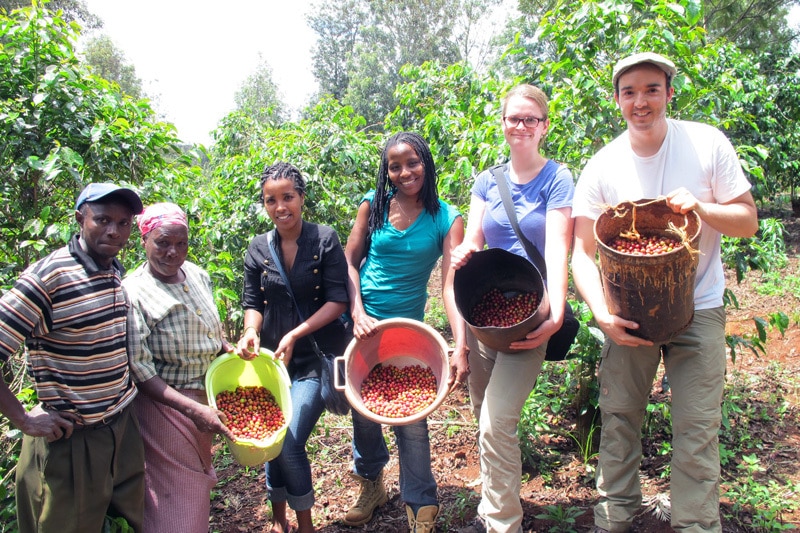Natural coffee is not the norm in Kenya, so when the Kedovo Project offered us one, we couldn’t say no!!! And it didn’t disappoint! It’s juicy and floral and delicate, with all of the sweetness of a natural process, without losing its crisp, clean aromas.
Kedovo e.V.
Kedovo e.V. do a lot of amazing work in Kenya, not just within coffee. If you want to learn more, or would be interested in volunteering with them, go to their website here. For this article, however, we will focus on the coffee side of things.
Based in the coffee growing areas of the Central Province in Kenya, the Kedovo Project’s main aim is to help the multiple farming members to improve coffee quality and productivity, set up quality testing centres to help farmers track the quality of their coffees and facilitate farmer grouping, to ensure greater market access and remove the need for a middleman, meaning that they can get a fairer price by working more with direct trade buyers.
“The process of cultivating coffee is lengthy and tiresome. How many people have the patience to wait for 4 years?” Asks Social Enterpreneur Muthoni Schneidewind.
” Yes, that is how long the coffee tree takes to thrive and yield its first bean! Most of these farmers grow the high quality SL-28 and SL-34, that are very delicate from planting to harvesting, the Arabica beans are selectively hand picked when the cherries are bright red and ripe – one beautiful cherry at a time. They require great care during harvesting. Their cherries fall to the ground after ripening and spoil and thus careful monitoring and interval picking is required. She continues: ”Coffee growing has been in my family for years, I myself grew up picking coffee as a child, I was educated with money from the coffee proceeds and it was a struggle. Everyday after school, together with my siblings we had to walk the 2 kilometre way down to the river, draw the muddy water to water the small coffee bushes! Four years … And then one day, the whole ridge was filled with fragrant white flowers, smell of ripe coffee berries, the noise of the happy weaver birds, our FIRST coffee harvest was ready”. She remembers.
The coffee growing communities in Nyeri have suffered. Nothing much has changed since Muthoni was a child. Most of them simply lack everything they need, they are still at the mercy of middlemen and brokers who buy their supplies and pay them a pittance for the valuable produce, they barely afford school fees for their children, some have cut down the trees and instead are now turning to growing staple foods, the coffee fields are neglected, the list is long!
With all these needs for her community weighing heavily on her mind the KEDOVO Coffee Project was founded.
“Empowering Coffee Farmers Through Value Addition” – Othaya Farmers Cooperative Society Statement
Othaya Farmers Cooperative Society is an organization of 19 small wet mills (known as “factories,”) in and around the town of Othaya in Nyeri county. The society was registered in 1956 with 250 farmers and has since grown to over 15,000 members. Their offices are located in the center of town, and the Gatuyaini factory is their production center, less than a kilometer up the hill from the main office. Many factors make Othaya extraordinary, chief among them strong social unity, a holistic approach to business management and a progressive view towards quality control throughout the supply chain. The society has a nursery and farm store to supply its members with inputs, equipment and seedlings. Farm management workshops are offered regularly, and factory managers are routinely trained on wet mill best practices. Othaya has sample roasting and cupping facilities at the Gatuyaini factory, and society staff cup samples of every lot delivered during the harvest season. Also at Gatuyaini factory is a complete dry milling installation, allowing the society to manage even the parchment hulling sorting and grading elements of their operation.
Online Shop:
